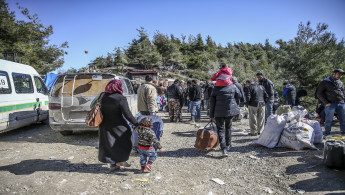Moscow fears return of 2,000 IS relatives could pose 'terror threat' to Russia
The Russian security service chief said on Thursday that there could be risks of attacks from the 2,000 women and children related to Russian fighters for the Islamic State group who are returning to Russia.
"Currently there are around 2,000 women and children on whom we have data who are relatives of fighters, that's just Russian nationals," the head of the FSB security service Alexander Bortnikov said at a regional security forum in Tashkent, Russia's official TASS news agency reported.
He said that this included both family members who are still in the Middle East or who have left the region.
Some of these may still have extremist views and could commit terror attacks back in Russia, he warned.
"Such returnees quite often adhere to extremist religious ideology," Bortnikov said.
Twitter Post
|
He said "the heads of international terror organisations target such people as suicide bombers, proselytisers and recruiters and agents for the underground terrorist network."
Moscow is a key ally of Syrian President Bashar al-Assad, has organised the repatriation of some wives and children of IS fighters. Many other states have refused to do so and taken steps to ensure that fighters and their relatives do not return.
Turkey's government said earlier this month that it would send foreign IS fighters captured in Syria back to their countries of origin, despite the unwillingness of several Europe states to take them in.
"We are not going to keep them until the end of time," Interior Minister Suleyman Soylu told reporters. "We're not a hotel for Daesh," he said, using another name for Islamic State.
Soylu said Turkey would hold captured foreign fighters "for some time. After that we'll send them back to their countries".
Follow us on Twitter and Instagram to stay connected





 Follow the Middle East's top stories in English at The New Arab on Google News
Follow the Middle East's top stories in English at The New Arab on Google News


